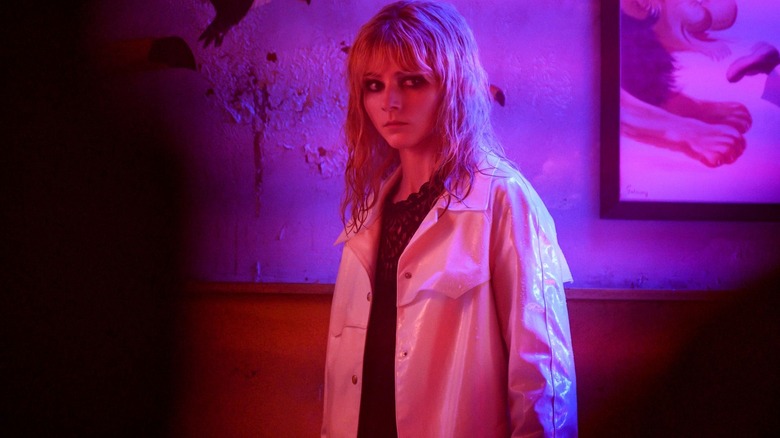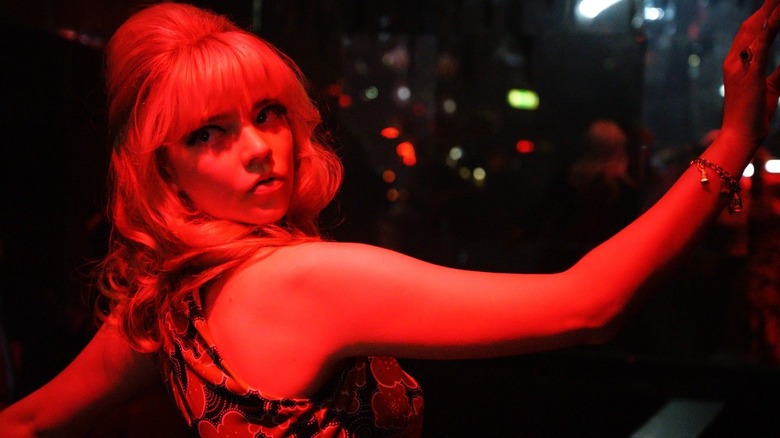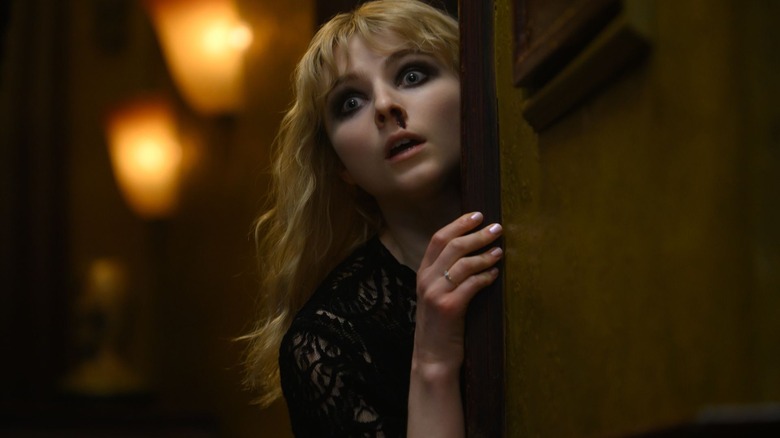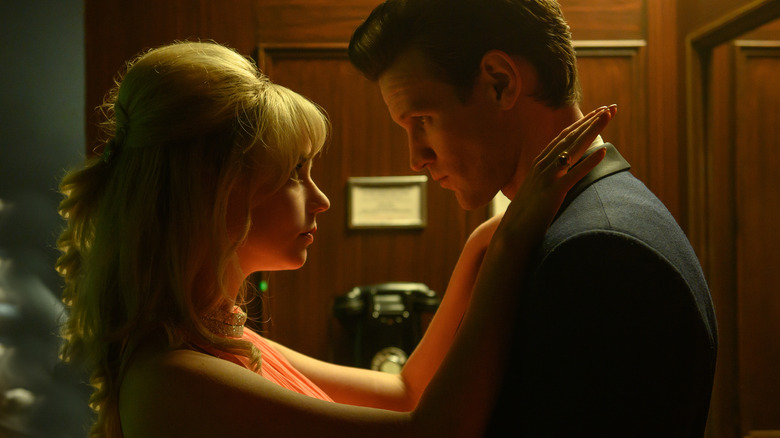Here's The Movie Homework Last Night In Soho Director Edgar Wright Gave His Co-Writer [Exclusive]
Watch any interview, Q&A, or behind-the-scenes featurette that Edgar Wright appears in and it's immediately apparent that the filmmaker straight-up lives and breathes movies. Actually, you know what? You could just watch any number of his previous movies — from "Shaun of the Dead" to "Hot Fuzz" to "Baby Driver" — and get a taste of the dizzying number of homages, references, and inspirations that go into each and every one of his passion projects. When it came time to making "Last Night in Soho," Wright did what he does best and made sure his creative team was prepared with as much research material as humanly possible.
/Film's Jacob Hall recently sat down for interviews with co-writer Krysty Wilson-Cairns ("Penny Dreadful," "1917") and director Edgar Wright, both of whom talked in-depth about the sorts of movie (and music!) recommendations that the distinctive and fan-favorite storyteller had up his sleeve to truly capture his vision for "Last Night in Soho."
Movies and Music
Anyone can gather together an unwieldly list of all their favorite movies that, in one respect or another, give an idea of what to expect from their script. You hear about filmmakers doing that sort of thing all the time in pitch meetings, particularly with Marvel movies. According to Wilson-Cairns, however, the movies Wright sent to her weren't about showing direct comparisons of similar movies that the final cut would ultimately resemble. Instead, it was about evoking a general, even subconscious feeling.
Amusingly, Wilson-Cairns doesn't even try to downplay the overwhelming amount of homework she was given:
"My God. Do you know what? I couldn't even begin. Some of it was like 'Taste of Honey,' a lot of the giallo genre, a lot of those kind of psychological thrillers, and then some of them obscure, BFI [British Film Institute], archive stuff, things you've never heard of. And it wasn't so much like, 'This is what I want to make.' It was more like, 'These are films that are set in Soho. These are films that were made here. This is a film that inspired me, but I don't know why,' and all this sort of stuff."
The humorous, good-natured, and self-deprecating Scottish screenwriter doesn't miss an opportunity to brag about Edgar Wright's music taste, either. Much has been written about Wright's continued reliance and emphasis on music in terms of crafting his films, and that certainly translated to the types of songs that Wright prepared for Wilson-Cairns while developing "Last Night in Soho." And if it were me, I would absolutely take advantage of a specially Wright-curated playlist, too. She told us:
"Yeah, I know a few people that know more about film than Edgar, film and music, because I don't have very good taste in music, right? At the party, no one never wants to give me the iPad. No one ever wants to let my Spotify go on. But briefly when I was working with him... First of all, he introduced me to the Sparks brothers, who are great. And I had this playlist, Five Star Soho, and I used to go to parties and dinner parties, and I'd be like, 'Oh, I'll put some music on.' And for like a year, all my friends were like, 'How's your taste in music gotten so good?' And now the movie's come out, they realize I just stole it."
A Wide Net
/Film also caught up with Edgar Wright, who offered even more firsthand details on the types of material that made it into his all-encompassing "stack of movies." In what increasingly seems like the go-to move for experienced filmmakers, Wright deliberately chose not to re-watch what he included in his list for Wilson-Cairns. But in vintage Edgar Wright fashion (and to the delight of those who love debating genre definitions), he goes on a bit of a tangent about giallo films as well:
"Well, I basically... It was a bit of a mix of things, actually, because in terms of me writing the script, I didn't really revisit some of the psychological horrors that I enjoyed growing up, because I was more okay with them, but I did give some to Krysty, because I didn't think she'd too many... She'd seen, obviously everybody has seen 'Rosemary's Baby' or everybody has seen 'Psycho,' but then, I'm not sure if Krysty has necessarily seen 'Frenzy,' or maybe she hadn't seen something like 'Dressed to Kill' or something like that, or even some of the lesser known giallos that are kind of interesting. There's obviously, when people talk about giallo films, the most famous ones, I guess, would be 'Bird with the Crystal Plumage' and 'Deep Red.'
It's funny, I'm not even sure that 'Suspiria' actually is a giallo film. That's something slightly different. I think 'Deep Red' is giallo film. But I would show her things like, slightly more obscures ones like 'The Short Night of the Glass Dolls,' and 'Don't Torture a Duckling.'"
Far from being a collection of one-note films, however, Wright made sure to include the full spectrum:
"But beyond that, the other big part of it, and maybe even the bigger part was just watching '60s dramas. And that was the thing for me, that I had seen some of the most famous ones, but I kept through in the process of developing this, just going deeper and deeper and deeper, getting into the B, C, D list. I don't mean in terms of quality, I mean, of how well known they are.
So it was a mix of some psychological thrillers, some giallos, a lot of British social drama, kitchen sink realism, stuff like 'Poor Cow' by Ken Loach, or something really brilliantly dark, like Joseph Losey's 'The Servant,' and then some documentaries as well."
The Exposé of British Night Life
"Last Night in Soho" dives into much darker and seedier territory than fans might be used to seeing from Wright. We can't say we weren't warned, however, with past interviews reminding us of how the films deals with the dangers of nostalgia and the exploitation of women. Fittingly, some of Wright's movie recommendations reflect similarly sordid topics as well, specifically "Mondo Cane" films. According to Wright:
"'Mondo Cane' [were] those documentaries that were half faked, sensationalistic, like travel logs from around the world, but showing brutal ceremonies. But then there was the British versions, where they were basically these 'sexsational' exposés of swinging London, with titles like 'West End Jungle,' and 'London in the Raw,' and 'Primitive London,' and 'Soho Stripped Bare,' discover the dark secrets in the heart of the West End. And they're really interesting, because half of them is clearly scenes that are faked for the camera, but they're showing you things that obviously they couldn't film. So, showing bars where gullible tourists were brought into a bar on the promise of meeting gorgeous ladies and then given non-alcoholic drinks, which they would have a massive upcharge on. So they're upselling these things to paying hundreds of pounds for basically blackberry juice.
And you see it all in this documentary, and then each drink would come with a cocktail stick and the girls would keep the cocktail stick, and basically how many cocktail sticks they had from these punters is what they would be paid in at the end of the night. So it's, can you see these girls with these cocktail sticks on the table? And that's their thing of like, 'Oh, I kept this guy talking, he bought six drinks, so I've got five cocktail sticks, and I'll take my money.' So this is a whole con game going on in London. So there are lots of those documentaries showing all of that, the exposé of British night life."
Taken as a whole, one would be forgiven for coming away from these quotes with the idea that "Last Night in Soho" has more on its mind than many of Edgar Wright's previous efforts – which would be saying a lot. "Last Night in Soho" opens in theaters today.



